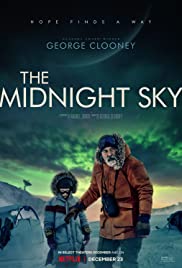
THE MIDNIGHT SKY
US, 2020, 118 minutes, Colour.
George Clooney, Felicity Jones, David Oyelowo, Kyle Chandler, Demian Bichir, Tiffany Boone, Caolinn Spingall.
Directed by George Clooney.
A drama of futuristic science-fiction, a setting of 2049, the information that there has been “an event� which has been apocalyptic, destroying Earth, destroying the population.
But, this is also futuristic science-fiction in space. In recent years, space stories have become very popular with the wide audience, films like Gravity, The Martian, Ad Astra. The Midnight Sky takes its place amongst these films. And, there is a particular connection. George Clooney was one of the stars of Gravity. He is the star here and has directed the film.
However, there is a remnant of life on Earth, an isolated station somewhere in the Arctic. At the opening, we see helicopters taking away the population leaving only the grizzled commander, Augustine, George Clooney. He carries on alone, meagre meals and the empty dining room, kills for his health, sick in his bathroom, nightly transfusions. He has vast equipment, contact with craft in space, but gradually seeing that all of them are out of contact, destroyed, except for one, Aether, but there are difficulties in actual communication. He sees his mission as warning them not to return to the destroyed Earth.
George Clooney, not as young as he used to be, not nearly, is bearded and grey, shuffling around the station, an old codger on what seems to be his last legs. The question arises, will he be able to sustain an almost 2 hour running time. Part of the solution is that he finds a little girl, Iris, who has been left behind (Caolinn Spingall). She is very young. She doesn’t speak. She shadows him and there is a growing bond between them, a grandfatherly bond. We see the routines of the station. At one stage, the to go out on an expedition, surveying the countryside covered in ice, packs of fierce animals, staying in a tent, finding an old shed but its flooding during the night, perils of the ice breaking, the shed sinking, having to trek back to the centre.
But, intercut with all of this is the story of Aether and its crew. The screenplay uses the device of showing an astronaut, Sully, Felicity Jones, on a beautiful sunny, mountainous, fertile moon of Jupiter, fearing that she has been left behind but is only a nightmare. She shares the work of flying the craft back to Earth with the Captain, Adewole, David Oyelowo, and a young astronaut, Maya (Tiffany Boone), and two veterans played by Kyle Chandler and Demian Bichir. We follow their story, interrupted by rather long episodes back in the Arctic, as they fly their machine, are caught in space ice floes and collisions at enormous speeds, going out to repair their craft and the radar, finally getting through to the Arctic and discovering the reality on Earth and what they are to do in terms of landing or returning to the Jupiter moon.
For those who enjoy films in space, there is a lot to interest as well as dialogue about life and death, life and meaning to ponder on. For those who are not so attracted to space stories, this particular version will seem rather ponderous.
1. Science-fiction? Space exploration? Futuristic? Apocalypse and post-Apocalypse?
2. The credibility of the plot? Human treatment of Earth? Disaster and Apocalypse? Its not being made explicit? The final view of Earth from the spacecraft, destruction?
3. The background, Augustine and his story, his lecture, the young woman, interrupting, the conversation? The relationship between them? His devoting himself to science, alienating her? Yet his achievement, discoveries, influence? Sully and her tribute?
4. Augustine, isolated, the Arctic setting, the station, its interiors, equipment, communication with space? The Arctic, the wild animals, snow and ice? The blizzards? The ice floes? The musical score?
5. Augustine, his age, George Clooney’s presence, pottering around the plant, the meagre meals, the emptiness, the pills, ill in the toilet, his transfusions? Prospects? The discovery of Iris? Her being left behind (and the image of the helicopters and the population leaving, the distraught mother)? And not speaking? Her presence, personality, her dress? Shadowing Augustine? His ousting her from the room, her return? Sharing the meals, the peas on the table?
6. The expedition, the tent, secure, finding the old hut, staying the night, the water submerging the hut, getting Iris out? On the ice, the ice breaking? Augustine, the equipment, getting out, the vehicle, into the water, the loss of the vehicle? The rescue? Their walking on foot?
7. The space story, the moon and Jupiter, Sully and her dream, left behind, the beauty and fertility of the planet? Her leadership with the crew? Adewole and his being the captain? Her relationship with him, pregnancy? Their working together? The voyage of the ship?
8. Maya, her age, her contribution, the virtual reality and her friends? Going out, her injury, the blood, her death?
9. Mitchell and Sanchez, age, experience, their work? Mitchell and his holograph with his wife? Sanchez and the story of his daughter’s death? His seeing Maya with her holograph? The impact of her death?
10. The difficulties of the voyage, the meteor storms and damage? Getting out, the group outside, gravity, mending? The radar? Maher and her injury, getting back inside? Treating her, the medical equipment, her death?
11. The contact with the Arctic, with Augustine, their admiration for him? The news about Earth? Mitchell and the message from his wife and her farewell?
12. The continued contact, advice from Augustine?
13. The decisions, Mitchell deciding to return to his family, Sanchez deciding to go with him, the farewell? The plane, going to Earth?
14. Sully, Adewole, together, the decision, turning around, going back to the planet? An Adam and Eve story?
15. The pessimism concerning earth? The optimism concerning space and the future?